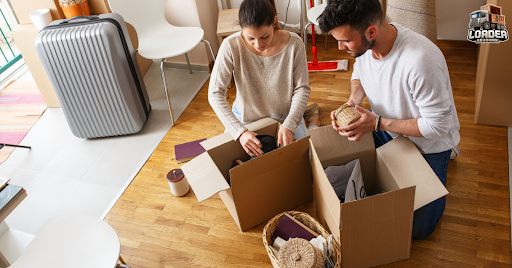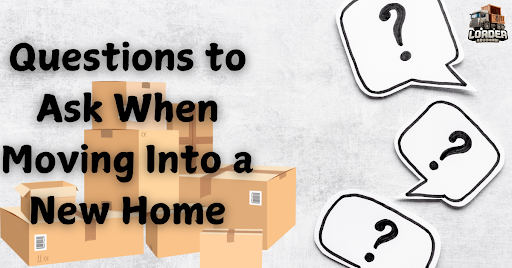Moving into a new home is an adventure filled with excitement and new opportunities, but it’s not without its challenges. From deciding whether it’s the right time to move to settling into your new neighborhood, there are countless decisions to make. Asking the right questions can help streamline the process, reduce stress, and ensure a smooth transition.
In this guide, we’ll explore the most essential questions you should ask yourself and practical advice for each stage of the moving process. Let’s dive in!
Is This the Right Time to Move?
Evaluating Personal and Financial Readiness
Timing a move is about more than just packing boxes. It involves taking stock of your current situation. Are you financially ready to handle the costs of moving? From securing a moving budget to ensuring you can cover unexpected expenses, financial stability is key. Additionally, consider personal factors such as a new job, a growing family, or simply the need for a fresh start. These aspects play a huge role in determining if the timing is right.
Think about your long-term goals too. If your current home no longer meets your needs or requires costly renovations, it might be the right time to move. Balancing emotional and practical readiness is essential to ensure you’re prepared for this big change.
Considering Market Conditions and Life Changes
Market conditions can significantly influence your decision. Research whether the real estate market in your area favors buyers or sellers. If you’re renting, check for trends in rental prices. For homeowners, a booming market might mean it’s a great time to sell your property and find a new home. On the personal side, major life changes like a promotion, marriage, or retirement might align perfectly with a move.
If you’re unsure, consider consulting a real estate expert. They can provide insights into whether now is the best time to find a place you love and start your next chapter.
What’s My Budget for Moving?

Estimating Moving Costs (DIY vs. Professional Movers)
Setting a realistic budget is crucial when planning a move. Begin by listing all potential expenses. If you opt for a DIY move, include costs for renting a truck, purchasing packing materials, and enlisting help for heavy lifting. Alternatively, hiring a professional moving company may include additional charges for services like packing or handling specialty items.
Using a cost estimator tool can help you get a clearer picture of your expenses. Be sure to account for any unexpected costs, such as fuel charges, temporary self-storage, or hotel stays if your new home isn’t move-in ready.
Hidden Expenses to Watch Out For
Moving comes with more hidden costs than most people anticipate. Beyond the obvious expenses, you might face charges for last-minute packing materials, tipping movers, or repairing damages caused during the move. Don’t forget about utility connection fees in your new home and potential deposits for services like internet or cable.
To minimize surprises, create a detailed checklist of expected expenses and keep some extra funds aside for emergencies. Having a buffer in your budget ensures you’re prepared for any unexpected costs.
Should I Hire Professional Movers or Do It Myself?
Pros and Cons of Hiring Professionals
Hiring a professional moving company can save you a lot of time and physical strain. Professionals are skilled at handling heavy or fragile household items, ensuring they arrive safely at your new home. They also bring expertise, providing services like moving insurance and efficient packing.
However, these services come at a cost. For those on a tight budget, self-moving might be a better option. While it requires more effort and planning, it can save significant money—especially if you have help from family or friends.
Key Factors to Compare Moving Companies
If you decide to hire movers, do your homework. Compare multiple moving quotes, read reviews, and check for hidden fees in their pricing. Consider the range of services offered, such as insurance options, packing assistance, or storage facilities. Choosing movers with solid customer feedback and transparent pricing ensures a hassle-free experience.
Additionally, look into their handling of specialty items like antiques or pianos. Not all movers are equipped to handle such tasks, so it’s important to confirm their capabilities beforehand.
How Can I Prepare for Moving Day?
Creating a Detailed Moving Timeline
Preparation is everything when it comes to a stress-free move. Start by creating a moving checklist that outlines tasks like decluttering, packing, and confirming logistics with your chosen movers. Break these tasks into weekly goals to stay organized and avoid last-minute panic.
A well-planned timeline can also help you identify potential obstacles early. For example, booking your movers in advance ensures availability, especially during peak moving seasons. A detailed plan keeps everything running smoothly.
Packing Strategies for Efficiency
Packing can be overwhelming, but smart strategies make a big difference. Begin with items you use least often, like seasonal decorations or stored items in your garage. Use alternative packing materials like blankets or towels to protect fragile items and save on supplies.
Label each box with its contents and designated room to simplify unpacking. Consider enlisting the help of professional packers if time is tight—they can handle everything efficiently, from creating a packing timeline to boxing up your belongings.
What Should I Know About My New Neighborhood?
Researching the Community, Schools, and Amenities
Your new neighborhood plays a big role in your day-to-day life. Research thoroughly before making a decision. Visit the area to get a sense of its vibe. Is it a quiet family-centered neighborhood or a bustling city environment? Investigate nearby schools, grocery stores, and hangout spots to ensure the location meets your needs.
Additionally, pay attention to public services like healthcare facilities and public transport. A well-rounded neighborhood enhances your overall living experience and makes the transition smoother.
Distance to Work, Friends, and Family
Location is everything when it comes to convenience. Calculate the drive to work, your child’s school, and family members’ homes. Understanding local traffic patterns can also help you avoid daily frustrations.
Living within walking distance of essential services can save time and money. Consider these factors to ensure your new home fits your lifestyle.
What Should I Do With Unwanted Items?
Decluttering and Donating Before the Move
Moving is the perfect opportunity to declutter. Go through your belongings and sort items into “keep,” “donate,” or “discard” categories. Donating items in good condition to local charities not only helps others but also reduces the number of boxes you need to pack.
For items you no longer use, hosting a garage sale or using online selling platforms can offset moving costs. Decluttering before the move ensures you start fresh in your new home.
Selling Items to Offset Moving Costs
Unused appliances, furniture, or collectibles can be sold online for extra cash. Platforms like Facebook Marketplace or eBay are excellent for reaching potential buyers. Every dollar you earn can go toward covering price estimates from your movers or purchasing new items for your new space.
Should I Invest in Moving Insurance?
Understanding the Value of Additional Insurance
Protecting your belongings is crucial during a move. Many moving companies offer Basic Limited Liability Protection, which covers a portion of damages or losses. However, for high-value or sentimental items, consider upgrading to Full Value Protection for comprehensive coverage.
Evaluate your risk factors. If you’re moving long distances or handling fragile items, investing in insurance provides peace of mind.
Evaluating the Coverage Provided by Movers
Before signing a contract, review the mover’s insurance policies. Some movers include basic insurance options, but you might need to purchase additional coverage for specialty items like artwork or electronics.
What Are the First Steps After Moving In?

Setting Up Utilities and Services
Setting up utilities is the first step to making your new house feel like home. Contact providers for water, electricity, and internet services well before moving day. Having these essentials ready makes settling in much easier.
Double-check your home for up-to-date appliances and test them for functionality. Address any immediate needs to avoid delays in getting comfortable.
Safety Checks and Inspections in Your New Home
Once you’ve moved in, prioritize safety. Inspect smoke detectors, locks, and any other safety features to ensure they’re in good condition. It’s also a good time to take pictures of the property for future reference or insurance purposes.
How Can I Make My Move Cost-Effective?
Tips to Reduce Moving Expenses
One of the easiest ways to save money is by timing your move during the off-peak season. Reusing moving boxes and sourcing free supplies from local stores also helps reduce expenses. Negotiating moving quotes with movers can often lead to better deals.
Additionally, plan meals ahead to avoid costly takeout expenses during the transition. Small savings add up quickly and make a big difference.
Negotiating with Movers and Finding Discounts
Don’t hesitate to ask movers for discounts or promotional offers. Many moving companies offer lower rates to first-time customers or during off-peak times. Being proactive can help you stay within budget without compromising on service quality.
Conclusion
Moving into a new home is a journey filled with opportunities and decisions. By asking the right questions, from financial planning to selecting the perfect neighborhood, you can ensure a seamless and stress-free move. Careful preparation, budgeting, and research will make your transition not only efficient but also enjoyable.

